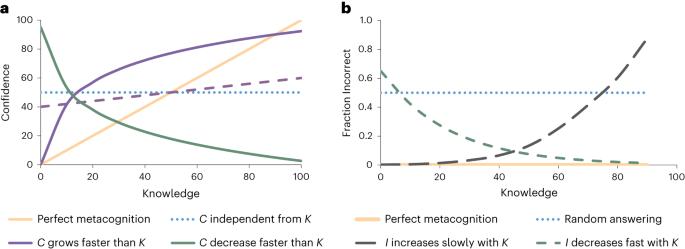科学知识的中级水平与过度自信和对科学的消极态度有关。
IF 15.9
1区 心理学
Q1 MULTIDISCIPLINARY SCIENCES
引用次数: 0
摘要
过度自信是一个普遍存在的问题,它与科学知识的关系尤其重要:不知道自己的无知会影响行为,威胁公共政策和健康。然而,目前尚不清楚信心是如何随着知识而变化的。在这里,我们研究了四项大型调查,涵盖30个 并提出了一个新的置信度指标。这一指标不依赖于自我报告或同行比较,将(过度)自信视为对科学事实问题给出错误答案的倾向,而不是“不知道”的回答。我们发现知识和信心之间存在非线性关系,过度自信(信心差距)在实际科学知识的中间水平达到峰值。这些高信心/中等知识群体也表现出对科学最不积极的态度。这些结果与当前的模型不同,通过识别特定的受众,可以帮助制定科学传播策略。本文章由计算机程序翻译,如有差异,请以英文原文为准。

Intermediate levels of scientific knowledge are associated with overconfidence and negative attitudes towards science
Overconfidence is a prevalent problem and it is particularly consequential in its relation with scientific knowledge: being unaware of one’s own ignorance can affect behaviours and threaten public policies and health. However, it is not clear how confidence varies with knowledge. Here, we examine four large surveys, spanning 30 years in Europe and the United States and propose a new confidence metric. This metric does not rely on self-reporting or peer comparison, operationalizing (over)confidence as the tendency to give incorrect answers rather than ‘don’t know’ responses to questions on scientific facts. We find a nonlinear relationship between knowledge and confidence, with overconfidence (the confidence gap) peaking at intermediate levels of actual scientific knowledge. These high-confidence/intermediate-knowledge groups also display the least positive attitudes towards science. These results differ from current models and, by identifying specific audiences, can help inform science communication strategies. Lackner et al. show that individuals with an intermediate level of science knowledge tend to have overconfidence in their own knowledge and negative attitudes to science.
求助全文
通过发布文献求助,成功后即可免费获取论文全文。
去求助
来源期刊

Nature Human Behaviour
Psychology-Social Psychology
CiteScore
36.80
自引率
1.00%
发文量
227
期刊介绍:
Nature Human Behaviour is a journal that focuses on publishing research of outstanding significance into any aspect of human behavior.The research can cover various areas such as psychological, biological, and social bases of human behavior.It also includes the study of origins, development, and disorders related to human behavior.The primary aim of the journal is to increase the visibility of research in the field and enhance its societal reach and impact.
 求助内容:
求助内容: 应助结果提醒方式:
应助结果提醒方式:


